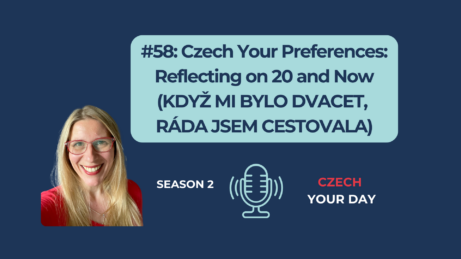Episode 30 (daily podcast CZECH YOUR DAY) transcript included

THIS WEEK’S TOPIC: DAYS OF THE WEEK + PARTS OF THE DAY
THE TRANSCRIPT/HANDOUT IS DOWN BELOW
This week’s story is about future plans. Don’t panic if you aren’t familiar with the future tense in Czech. I explain the 2 expressions you will need in the episode.
This is the transcript from the episode. I highly recommend you to download the handout down below and work with both if you are a beginner/false beginner.
As you can see I have used tons of expressions from the previous weeks. If you still struggle, go back and listen to them again and work with the handouts.
My Week in Czech: A Story
- Monday Afternoon: „V pondělí odpoledne půjdu do supermarketu.“
Translation: „On Monday afternoon, I will go to the supermarket.“ - Tuesday Noon: „V úterý v poledne půjdu do restaurace na oběd.“
Translation: „On Tuesday at noon, I will go to a restaurant for lunch.“ - Wednesday Afternoon: „Ve středu odpoledne půjdu s kamarádkou do kina. Domů pojedu až večer. Do města nepojedu autem, pojedu tramvají.“
Translation: „On Wednesday afternoon, I will go to the cinema with a friend. I will go home only in the evening. I won’t drive to town, I will take the tram.“ - Friday Morning: „V pátek ráno nepojedu do práce. Budu pracovat doma.“
Translation: „On Friday morning, I won’t go to work. I will work from home.“ - Saturday Night: „V sobotu v noci nepůjdu do města, protože budu spát.“
Translation: „On Saturday night, I won’t go to the city because I will be sleeping.“ - Sunday Morning: „V neděli ráno pojedu do obchodu. Pojedu autem.“
Translation: „On Sunday morning, I will go to the shop. I will go by car.“
Questions and Answers
- Question: „Kdy půjde Renča do supermarketu?“
Translation: „When will Renča go to the supermarket?“
Answer: „Renča půjde do supermarketu v pondělí odpoledne.“
Translation: „Renča will go to the supermarket on Monday afternoon.“ - Question: „Co bude Renča dělat v úterý v poledne?“
Translation: „What will Renča do on Tuesday at noon?“
Answer: „Renča půjde do restaurace na oběd.“
Translation: „Renča will go to a restaurant for lunch.“ - Question: „Pojede Renča ve středu odpoledne do města autem?“
Translation: „Will Renča drive to town on Wednesday afternoon?“
Answer: „Ne, Renča nepojede autem. Renča pojede tramvají.“
Translation: „No, Renča won’t drive. Renča will take the tram.“ - Question: „Půjde Renča ve středu odpoledne s kamarádkou do kavárny?“
Translation: „Will Renča go to the café with a friend on Wednesday afternoon?“
Answer: „Ne, Renča nepůjde ve středu s kamarádkou do kavárny. Renča půjde ve středu odpoledne s kamarádkou do kina.“
Translation: „No, Renča won’t go to the café with a friend on Wednesday. Renča will go to the cinema with a friend on Wednesday afternoon.“ - Question: „Kdy Renča nepojede do práce? Kdy bude Renča pracovat doma?“
Translation: „When won’t Renča go to work? When will Renča work from home?“
Answer: „Renča nepojede do práce v pátek ráno.“
Translation: „Renča won’t go to work on Friday morning.“ - Question: „Půjde Renča v sobotu v noci do města?“
Translation: „Will Renča go to the city on Saturday night?“
Answer: „Ne, Renča nepůjde v sobotu v noci do města. Renča bude v sobotu v noci spát.“
Translation: „No, Renča won’t go to the city on Saturday night. Renča will be sleeping on Saturday night.“ - Question: „Pojede Renča do obchodu v neděli odpoledne?“
Translation: „Will Renča go to the shop on Sunday afternoon?“
Answer: „Ne, Renča nepojede do obchodu v neděli odpoledne. Renča pojede do obchodu v neděli ráno.“
Translation: „No, Renča won’t go to the shop on Sunday afternoon. Renča will go to the shop on Sunday morning.“
Komentáře








